4 styles
Tester
Weights
Glyphs
Languages
Abenaki, Afaan Oromo, Afar, Afrikaans, Albanian, Alsatian, Amis, Anuta, Aragonese, Aranese, Aromanian, Arrernte, Arvanitic, Asturian, Atayal, Aymara, Bashkir, Basque, Belarusian, Bemba, Bikol, Bislama, Bosnian, Breton, Cape Verdean, Catalan, Cebuano, Chamorro, Chavacano, Chichewa, Chickasaw, Cimbrian, Cofan, Corsican, Creek, Crimean Tatar, Croatian, Czech, Danish, Dawan, Delaware, Dholuo, Drehu, Dutch, English, Esperanto, Estonian, Faroese, Fijian, Filipino, Finnish, Folkspraak, French, Frisian, Friulian, Galician, Ganda, Genoese, German, Gikuyu, Gooniyandi, Greenlandic, Guadeloupean, Gwichin, Haitian Creole, Han, Hawaiian, Hiligaynon, Hopi, Hotcak, Hungarian, Icelandic, Ido, Ilocano, Indonesian, Interglossa, Interlingua, Irish, Istroromanian, Italian, Jamaican, Javanese, Jerriais, Kala Lagaw Ya, Kapampangan, Kaqchikel, Karakalpak, Karelian, Kashubian, Kikongo, Kinyarwanda, Kiribati, Kirundi, Klingon, Kurdish, Ladin, Latin, Latino Sine, Latvian, Lithuanian, Lojban, Lombard, Low Saxon, Luxembourgish, Maasai, Makhuwa, Malay, Maltese, Manx, Maori, Marquesan, Meglenoromanian, Meriam Mir, Mirandese, Mohawk, Moldovan, Montagnais, Montenegrin, Murrinhpatha, Nagamese Creole, Ndebele, Neapolitan, Ngiyambaa, Niuean, Noongar, Norwegian, Novial, Occidental, Occitan, Oshiwambo, Ossetian, Palauan, Papiamento, Piedmontese, Polish, Portuguese, Potawatomi, Qeqchi, Quechua, Rarotongan, Romanian, Romansh, Rotokas, Sami Inari, Sami Lule, Sami Northern, Sami Southern, Samoan, Sango, Saramaccan, Sardinian, Scottish Gaelic, Serbian, Seri, Seychellois, Shawnee, Shona, Sicilian, Silesian, Slovak, Slovenian, Slovio, Somali, Sorbian Lower, Sorbian Upper, Sotho Northern, Sotho Southern, Spanish, Sranan, Sundanese, Swahili, Swazi, Swedish, Tagalog, Tahitian, Tetum, Tok Pisin, Tokelauan, Tongan, Tshiluba, Tsonga, Tswana, Tumbuka, Turkish, Turkmen, Tuvaluan, Tzotzil, Ukrainian, Uzbek, Venetian, Vepsian, Volapuk, Voro, Wallisian, Walloon, Waraywaray, Warlpiri, Wayuu, Welsh, Wikmungkan, Wiradjuri, Wolof, Xavante, Xhosa, Yapese, Yindjibarndi, Zapotec, Zulu, Zuni
About Foundry Old Style
Foundry Old Style is a transitional roman in the classical tradition and shows the influence of the pen stroke in incunabula printed types. The first typeface to be released by The Foundry in 1990. The initial concept was already in progress before The Foundry was formed and David Quay wanted desperately to design a renaissance old style serif font.
Inspired by the incunabula typefaces of Nicolas Jensen, David created the first letterforms as calligraphy, with the main aim of retaining the structure and free form spirit of the pen stroke in the final drawings. Although the pen stroke forms the structure of the letterforms, it is not as apparent as in these early types and it is less refined than the later Garamonds. Originally David made a free-hand interpretation using an old broken clarinet reed and fountain pen ink discarded by his daughter Hannah. All the letters were created freely, then David and Freda redrew many times onto detail paper, carefully traced onto tracing paper and then finally digitised using Ikarus software.
The resulting face is a lovingly crafted, contemporary translation that retains the classical tradition of the transitional roman style. Initially Foundry Old Style was conceived and developed as a text face, with a small weight range of Book, Medium and Bold with an accompanying Book Italic for classical book work and has an extremely versatile design, this compliments Foundry Sans as a font pairing companion.
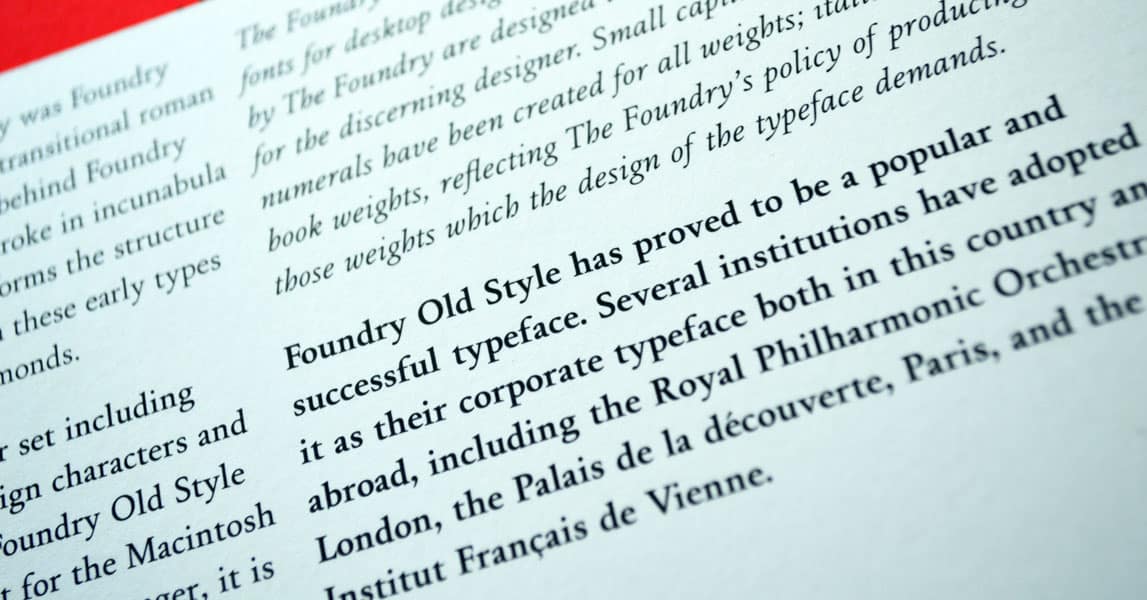
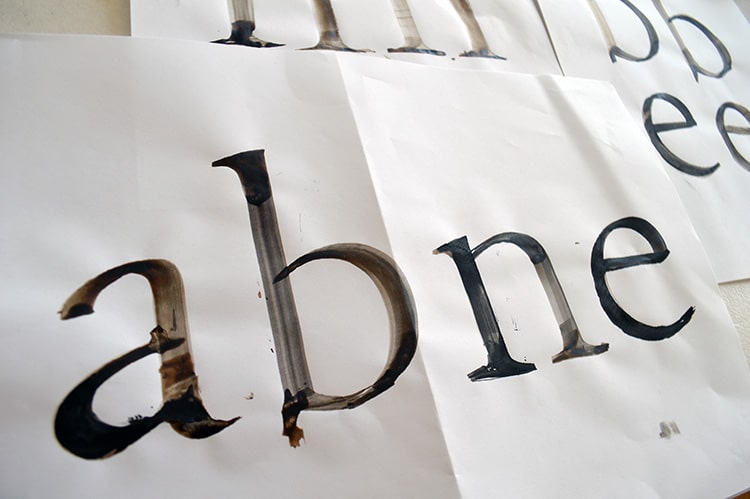
Initial rough lettering using clarinet reed and ink by David.
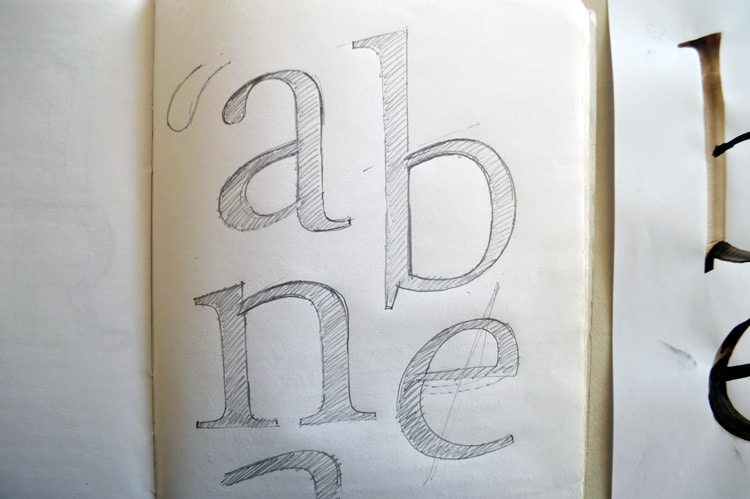
Foundry Old Style pencil sketch.
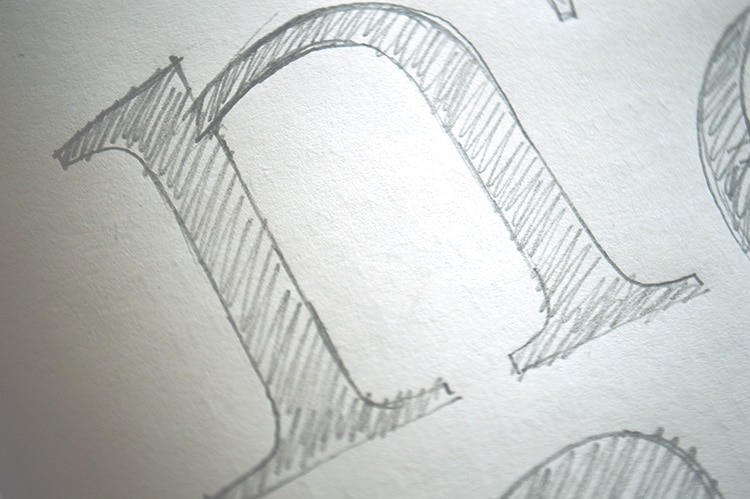
Developed pencil sketch.
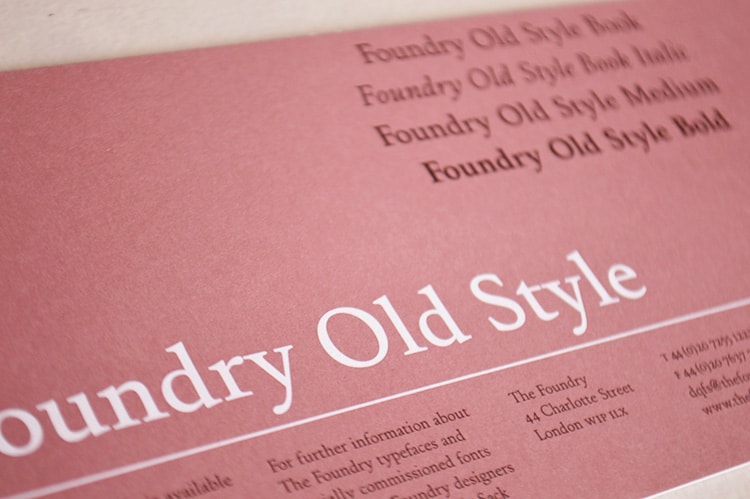
Foundry Old Style flyer front.
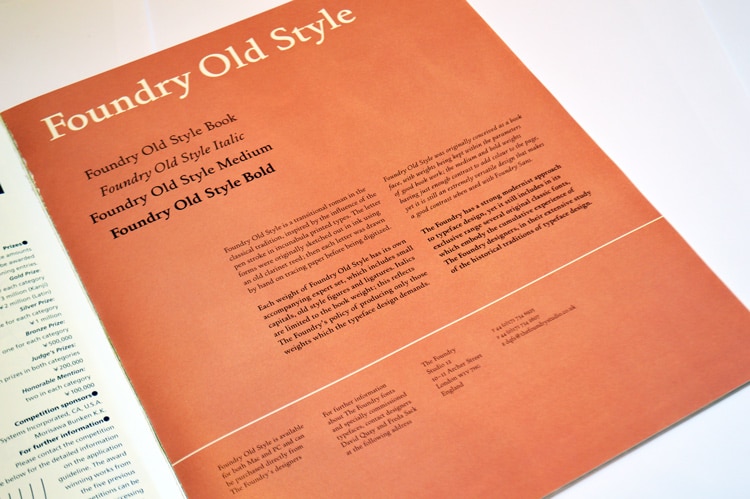
Foundry Old Style, Eye 28, Summer 1998, p.23.
Licence Foundry Old Style through Monotype
The original Foundry font collection is currently available exclusively from Monotype, you can purchase a licence to use these typefaces at Fonts.com, FontShop, Linotype, and MyFonts, via the following links.